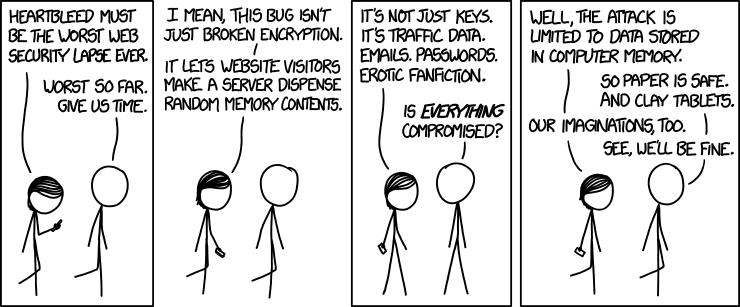![]() My weekly Guild Wars 2 community round-up at GuildMag is now online. There has been even more information about Feature Pack release coming on the 15th and there’s lots of reaction from the GW2 community. There’s also still a 50% off sale on digital copies of Guild Wars 2 running: get ’em while they’re cheap! In addition, there’s the usual assortment of blog posts, videos, podcasts, and fan fiction from around the GW2 community.
My weekly Guild Wars 2 community round-up at GuildMag is now online. There has been even more information about Feature Pack release coming on the 15th and there’s lots of reaction from the GW2 community. There’s also still a 50% off sale on digital copies of Guild Wars 2 running: get ’em while they’re cheap! In addition, there’s the usual assortment of blog posts, videos, podcasts, and fan fiction from around the GW2 community.
April 11, 2014
This week in Guild Wars 2
Virginia bans campus “free speech zones”
The way the fight for free speech has been going, you might be forgiven for reading that headline as “Virginia bans free speech”, but fortunately it’s actually a significant improvement in the right of university students to speak freely:
On Friday, Virginia Governor Terry McAuliffe signed a bill into law effectively designating outdoor areas on the Commonwealth’s public college campuses as public forums, where student speech is subject only to reasonable, content- and viewpoint-neutral time, place, and manner restrictions. Under this new law, college students at Virginia’s public universities will not be limited to expressing themselves in tiny “free speech zones” or subject to unreasonable registration requirements.
HB 258, championed by its lead patron Delegate Scott Lingamfelter, passed both houses of the Virginia General Assembly unanimously. The Foundation for Individual Rights in Education (FIRE) urged the passage of the bill and testified on behalf of the legislation in hearings in both legislative houses.
“FIRE thanks Governor McAuliffe, Delegate Lingamfelter, and all of Virginia’s delegates and senators for coming together and supporting this legislation,” said FIRE Legislative and Policy Director Joe Cohn. “One in six public colleges in the United States unjustly restricts student speech with free speech zones. Thanks to this new law, public institutions in Virginia will no longer be among them.”
Restricting student speech to tiny “free speech zones” diminishes the quality of debate and discussion on campus by preventing expression from reaching its target audience. Often, institutions that maintain these restrictive policies also employ burdensome permitting schemes that require students to obtain administrative permission days or even weeks before being allowed to speak their minds. Even worse, many of these policies grant campus administrators unfettered discretion to deny applications based on the viewpoint or content of the speakers’ intended message.
QotD: Romantic views of death in battle
And we ourselves? Let us not have too much hope. The chances are that, if we go to war, eager to leap superbly at the cannon’s mouth, we’ll be finished on the way by an ingrowing toenail or by being run over by an army truck driven by a former Greek bus-boy and loaded with imitation Swiss cheeses made in Oneida, N. Y. And that if we die in our beds, it will be of measles or albuminuria.
The aforesaid Crile, in one of his smaller books, A Mechanistic View of War and Peace, has a good deal to say about death in war, and in particular, about the disparity between the glorious and inspiring passing imagined by the young soldier and the messy finish that is normally in store for him. He shows two pictures of war, the one ideal and the other real. The former is the familiar print, “The Spirit of ’76,” with the three patriots springing grandly to the attack, one of them with a neat and romantic bandage around his head apparently, to judge by his liveliness, to cover a wound no worse than an average bee-sting. The latter picture is what the movie folks call a close-up of a French soldier who was struck just below the mouth by a German one-pounder shell a soldier suddenly converted into the hideous simulacrum of a cruller. What one notices especially is the curious expression upon what remains of his face an expression of the utmost surprise and indignation. No doubt he marched off to the front firmly convinced that, if he died at all, it would be at the climax of some heroic charge, up to his knees in blood and with his bayonet run clear through a Bavarian at least four feet in diameter. He imagined the clean bullet through the heart, the stately last gesture, the final words: “Therese! Sophie! Olympe! Marie! Suzette! Odette! Denise! Julie! … France!” Go to the book and see what he got … Dr. Crile, whose experience of war has soured him against it, argues that the best way to abolish it would be to prohibit such romantic prints as “The Spirit of ’76” and substitute therefore a series of actual photographs of dead and wounded men. The plan is plainly of merit. But it would be expensive. Imagine a war getting on its legs before the conversion of the populace had become complete. Think of the huge herds of spy-chasers, letter-openers, pacifist-hounds, burlesons and other such operators that it would take to track down and confiscate all those pictures!
H.L. Mencken, “Exeunt Omnes”, Prejudices: Second Series, 1920.
Open source software and the Heartbleed bug
Some people are claiming that the Heartbleed bug proves that open source software is a failure. ESR quickly addresses that idiotic claim:
I actually chuckled when I read rumor that the few anti-open-source advocates still standing were crowing about the Heartbleed bug, because I’ve seen this movie before after every serious security flap in an open-source tool. The script, which includes a bunch of people indignantly exclaiming that many-eyeballs is useless because bug X lurked in a dusty corner for Y months, is so predictable that I can anticipate a lot of the lines.
The mistake being made here is a classic example of Frederic Bastiat’s “things seen versus things unseen”. Critics of Linus’s Law overweight the bug they can see and underweight the high probability that equivalently positioned closed-source security flaws they can’t see are actually far worse, just so far undiscovered.
That’s how it seems to go whenever we get a hint of the defect rate inside closed-source blobs, anyway. As a very pertinent example, in the last couple months I’ve learned some things about the security-defect density in proprietary firmware on residential and small business Internet routers that would absolutely curl your hair. It’s far, far worse than most people understand out there.
[…]
Ironically enough this will happen precisely because the open-source process is working … while, elsewhere, bugs that are far worse lurk in closed-source router firmware. Things seen vs. things unseen…
Returning to Heartbleed, one thing conspicuously missing from the downshouting against OpenSSL is any pointer to an implementation that is known to have a lower defect rate over time. This is for the very good reason that no such empirically-better implementation exists. What is the defect history on proprietary SSL/TLS blobs out there? We don’t know; the vendors aren’t saying. And we can’t even estimate the quality of their code, because we can’t audit it.
The response to the Heartbleed bug illustrates another huge advantage of open source: how rapidly we can push fixes. The repair for my Linux systems was a push-one-button fix less than two days after the bug hit the news. Proprietary-software customers will be lucky to see a fix within two months, and all too many of them will never see a fix patch.
Update: There are lots of sites offering tools to test whether a given site is vulnerable to the Heartbeat bug, but you need to step carefully there, as there’s a thin line between what’s legal in some countries and what counts as an illegal break-in attempt:
Websites and tools that have sprung up to check whether servers are vulnerable to OpenSSL’s mega-vulnerability Heartbleed have thrown up anomalies in computer crime law on both sides of the Atlantic.
Both the US Computer Fraud and Abuse Act and its UK equivalent the Computer Misuse Act make it an offence to test the security of third-party websites without permission.
Testing to see what version of OpenSSL a site is running, and whether it is also supports the vulnerable Heartbeat protocol, would be legal. But doing anything more active — without permission from website owners — would take security researchers onto the wrong side of the law.
And you shouldn’t just rush out and change all your passwords right now (you’ll probably need to do it, but the timing matters):
Heartbleed is a catastrophic bug in widely used OpenSSL that creates a means for attackers to lift passwords, crypto-keys and other sensitive data from the memory of secure server software, 64KB at a time. The mega-vulnerability was patched earlier this week, and software should be updated to use the new version, 1.0.1g. But to fully clean up the problem, admins of at-risk servers should generate new public-private key pairs, destroy their session cookies, and update their SSL certificates before telling users to change every potentially compromised password on the vulnerable systems.
April 10, 2014
Former finance minister Jim Flaherty has died
The former federal finance minister and MP for Whitby-Oshawa (my riding) is reported to have died earlier today:
Jim Flaherty, Canada’s finance minister, smiles while speaking during a press conference after releasing the 2014 Federal Budget on Parliament Hill in Ottawa, Ontario, Canada, on Tuesday, Feb. 11, 2014. Flaherty ramped up efforts to return the country to surplus in a budget that raises taxes on cigarettes and cuts benefits to retired government workers while providing more aid for carmakers. Photographer: Cole Burston/Bloomberg via Getty Images
Former finance minister Jim Flaherty has died. He was 64.
Emergency crews were called to his Ottawa home Thursday afternoon. The cause of death has not been released.
He was one of the longest serving finance ministers Canada has ever had and until he left politics, was the only one to ever serve under Prime Minister Stephen Harper. He stepped down on March 18.
A Conservative MP for the Toronto-area riding of Whitby-Oshawa, Flahery was first elected in 2006.
Flaherty has suffered over the last year from a rare and painful but treatable skin disorder. In his statement, Flaherty said his health did not play a part in his decision to quit politics.
My deepest condolences to his wife Christine Elliot, and their sons John, Galen, and Quinn (Galen and Quinn were players on soccer teams I coached a decade or so back).
I may have to pay attention to the Masters this year

Garrick is a cousin of mine (on my mother’s side). We’ve never met, but that’s true of a lot of my distant relatives … the pond does get in the way of regular visits.
Policing the language, German style
Matthias Heitmann on the odd things that happen to avoid any hint of Nazi contamination in allowable letter combinations on license plates and to mandate equal gender presence in job titles and place names:
In Germany today, you see, there is a palpable desire to cleanse society of views officially deemed unacceptable or politically incorrect. This is most obvious when it comes to words or views associated with fascism or the far right. It’s likely that even the most liberal of Germans would oppose the right of members of the right-wing National Democratic Party to voice their strange views in public. Indeed, having embarrassingly failed to ban the party in 2003, the federal government is currently trying to outlaw the party once again. Anyone attempting to defend free speech or freedom of association in this context will find themselves accused of being a fascist sympathiser, an apologist or, even worse, disrespecting victims of the Holocaust and their descendants.
The popular fear of being accused of being a Nazi sympathiser has resulted in some strange regulations. Since the 1980s, for instance, the letter combinations ‘NS’, ‘KZ’, ‘SS’, ‘SA’ or ‘HJ’, which all potentially allude to fascist symbols or institutions, have been banned from use on car licence plates. In the past few months, there has been a heated debate about whether letter or number combinations like ‘HH’ or ‘88’ (which both allude to ‘Heil Hitler’), ‘18’ (meaning ‘Adolf Hitler’), 204 (meaning Hitler’s birthday) or even ‘GV’ (which is short for sexual intercourse) should be banned from licence plates, too. This poses something of a problem for Hamburg car owners, whose licence plates all start with ‘HH’.
[…]
It’s not only on the traditional minefield of racism and fascism that free speech has suffered in Germany. Free speech has also been knocked about by feminists, too, with their determination to impose new language and behaviour regulations. Last summer, for instance, the University of Leipzig announced plans to address its staff using only the feminine forms of words. ‘Professorin’ is due to replace older formulations like ‘Professorinnen und Professoren’ or ‘Professor/innen’. Schröder, meanwhile, admitted during a recent interview that not even the Bible is immune from linguistic tinkering. When talking to girls, for instance, the masculine ‘der Gott’ could simply become the neutral ‘das Gott’.
Interestingly, when feminist language control clashes with anti-fascist dogma, feminism seems to prevail. In the German capital, Berlin, a local parliament, heavily dominated by green and left-wing politicians, voted against naming a square in front of the Jewish Museum after the Enlightenment philosopher Moses Mendelssohn. This decision was made on the grounds that as Mendelssohn was a man, he would break the rule established in 2005 to only name streets and squares after women. This was deemed necessary in order to achieve sexual equality on the city map. As a compromise, the local parliament used Mendelssohn wife’s name alongside his own, creating ‘Moses-und-Fromet-Mendelssohn-Platz’. Although Fromet wasn’t a historic figure, she at least was a woman.
QotD: Confirmation bias for thee but not for me
The last few days have provided both a good laugh and some food for thought on the important question of confirmation bias — people’s tendency to favor information that confirms their pre-existing views and ignore information that contradicts those views. It’s a subject well worth some reflection.
The laugh came from a familiar source. Without (it seems) a hint of irony, Paul Krugman argued on Monday that everyone is subject to confirmation bias except for people who agree with him. He was responding to this essay Ezra Klein wrote for his newly launched site, Vox.com, which took up the question of confirmation bias and the challenges it poses to democratic politics. Krugman acknowledged the research that Klein cites but then insisted that his own experience suggests it is actually mostly people he disagrees with who tend to ignore evidence and research that contradicts what they want to believe, while people who share his own views are more open-minded, skeptical, and evidence driven. I don’t know when I’ve seen a neater real-world example of an argument that disproves itself. Good times.
Yuval Levin, “Confirmation Bias and Its Limits”, National Review, 2014-04-09
New poll shows PCs leading Liberals in Ontario
As always with polls, take a big pinch of salt before you take them too seriously:
A new poll suggests Ontario’s Progressive Conservatives have taken the lead in popular support over the Liberals in the wake of the gas plant scandal, according to a published report.
A Forum Research poll conducted for the Toronto Star suggests Tim Hudak’s Tories have 38 per cent of support, versus 31 per cent for the Liberals. Andrea Howarth’s New Democrats are at 23 per cent.
Two weeks ago, Premier Kathleen Wynne’s Liberals led with 35 per cent of support, while the Tories were at 32 per cent and the NDP at 25 per cent.
The surge is attributed mainly to the simmering gas plants scandal.
“It’s almost all due to the scandal over the deletion of those emails concerning the gas plants,” Forum president Lorne Bozinoff told 680News.
The poll also reveals that 45 per cent of those surveyed believe Wynne knew about the alleged deleting of emails related to the gas plants.
It also found that 47 per cent believe she ordered deletions.
“We did ask was the premier aware — a lot of people believe the premier was aware,” Bozinoff said.
“We also asked if people think a crime has been committed and a lot of people also think a crime has been committed.”
Of course, as long as Horwath’s NDP continue to prop up the Liberals, there won’t be a provincial election … and I doubt Horwath sees much chance of improvement over the current poll numbers. The only way the Ontario NDP will topple the government is if the scandal gets worse: the NDP can get more of their agenda passed by the Liberals than they could in a Conservative legislature, but the NDP can’t afford to look as though they’re in any way complicit in covering up wrongdoing — that would offend their base even more than it would offend undecided voters.
Update: This is one of the reasons you need to take poll numbers with a degree of skepticism:
Ooookay. Forum poll of ON, today: PC 38 Lib 31 NDP 23. Ekos, *yesterday*: Lib 32 NDP 29 PC 27. http://t.co/RdS4ZBaTmt http://t.co/DKnC1rEwH0
— Andrew Coyne (@acoyne) April 10, 2014
Chiles, peppers, and world trade before globalization
ESR linked to an interesting discussion of the spread of chile peppers and other exotic spices from the Roman empire onwards:
Can you imagine a world without salsa? Or Tabasco sauce, harissa, sriracha, paprika or chili powder?
I asked myself that question after I found a 700-year-old recipe for one of my favorite foods, merguez — North Africa’s beloved lamb sausage that is positively crimson with chiles. The medieval version was softly seasoned with such warm spices as black pepper, coriander and cinnamon instead of the brash heat of capsicum chile peppers — the signature flavor of the dish today.
The cuisines of China, Indonesia, India, Bhutan, Korea, Hungary and much of Africa and the Middle East would be radically different from what they are today if chiles hadn’t returned across the ocean with Columbus. Barely 50 years after the discovery of the New World, chiles were warming much of the Old World. How did they spread so far, so fast? The answers may surprise you — they did me!
I learned that Mamluk and Ottoman Muslims were nearly as responsible for the discovery of New World peppers as Columbus — but I’m getting ahead of myself.
The global pepper saga begins in the first millennium bce with the combustible career of another pepper — black pepper (Piper nigrum) and its cousins, Indian long pepper and Javanese cubeb. Although Piper nigrum was first grown on the Malabar Coast in India, the taste for it enflamed the ancient world: No matter what the cost — and it was very high — people were mad for pepper. The Romans, for example, first tasted it in Egypt, and the demand for it drove them to sail to India to buy it. In the first century, Pliny complained about the cost: “There is no year in which India does not drain the Roman Empire of fifty million sesterces.”
In one sense, the whole global system of trade — the sea and land routes throughout the known world that spread culture and cuisine through commerce — was engaged with the appetite for pepper, in its growth, distribution and consumption.

Dried chiles shipped well worldwide. From top-left: New World Capsicum annuum varieties include guajillo, ancho and New Mexico; a smaller Capsicum frutescens variety called “birdseye” chiles spread wild in Africa after birds spread their seeds from early gardens, and they are now common also in Southeast Asia; “Indian” chiles are among the most common varieties in India, which today grows and exports more chiles than any other nation. Bottom-left: Three popular capsicum peppers that took root in the Middle East — Maraş, Urfa and Aleppo, shown below in their flaked form — are used in dishes throughout the region. Bottom-right: Fresh serrano, poblano and ripe jalapeño peppers.
ESR said in his brief G+ posting:
More about the early and very rapid spread of capsicum peppers in the Old World than I’ve ever seen in one place before.
I also didn’t know they were such a nutritional boon. It appears one reason they became so entrenched is they’re a good source of Vitamin C in peasant cuisines centered around a starch like rice. My thought is that moderns may tend to miss this point because we have so much better access to citrus fruits and other very high-quality C sources.
The bit about paprika having been introduced to Hungary by the Ottomans was also particularly interesting to me. This was less than 30 years after they had reached the Old World.
Erasing the 49th parallel? Not so fast…
Froma Harrop reviews the latest hare-brained scheme geopolitical notion of Diane Francis:
What country do Americans overwhelmingly like the most? Canada.
What country do Canadians pretty much like the most? America.
What country has the natural resources America needs? Canada.
What country has the entrepreneurship, technology and defense capability Canada needs? America.
Has the time come to face the music and dance? Yes, says Diane Francis, editor-at-large at the National Post in Toronto. Her book Merger of the Century: Why Canada and America Should Become One Country is both provocative and persuasive.
“The genius of both societies is that they are very good at assimilating people from all over the world,” Francis told me. “So why can’t they do it themselves?”
Relatively small differences are why. Canadian intellectuals have long portrayed the United States as their violent, unruly twin. Many conservatives in this country, meanwhile, deride Canada as the socialistic land of single-payer medicine, gun control and other heavy regulation.
“I don’t buy the narrative of American exceptionalism or Canadian superiority,” says Francis, a dual citizen (born in Chicago). “Both have good points and bad points.”
Americans close to the border already think a lot like Canadians, she notes. Some northern states actually have more liberal laws and lower crime rates than Canada’s. “They are more Canadian than Canadians.”
We have a set of alliances that ensure continental security is underwritten by the world’s most powerful military. We have a free trade arrangement between the two countries that also includes Mexico. Our respective intelligence services co-operate (along with the UK, New Zealand, and Australia) at a very deep level — both for good (shared military surveillance, analysis, and security) and for ill (very significant individual privacy concerns).
Our economies are strongly inter-linked, but both are still subject to outside forces and inside stresses that affect each country differently.
In other words, aside from the minor convenience of not having to carry passports when moving from one country to the other (and the way the US is moving, that may no longer be true for Americans travelling domestically in a few years), we already have most of the benefits of a merger with none of the drawbacks: the American legal system is a terrifying beast to behold, US federal and state governments are far more intrusive and undemocratic in practice despite the legal framework of the Constitution and the Bill of Rights, and the US political system is if possible even more terrifying than their legal system.
Canada’s legal system could benefit from a few key reforms (getting rid of the human rights tribunals would be a good one, for example), but seem to work in a manner that is both faster and more visibly fair than their American counterparts. Our form of government looks (to American eyes) to be dictatorial, yet yields to democratic pressure from the voters most of the time (most recent example: Quebec). Our head of government is just a politician … and that’s all we expect of a Prime Minister. Our head of state doesn’t even live here, and we’re totally okay with that, too. Of course, if such a merger did take place, the head of state still wouldn’t live here…
A merger? I don’t think so.
April 9, 2014
XKCD on the impact of “Heartbleed”
Update: In case you’re not concerned about the seriousness of this issue, The Register‘s John Leyden would like you to think again.
The catastrophic crypto key password vulnerability in OpenSSL affects far more than web servers, with everything from routers to smartphones also affected.
The so-called “Heartbleed” vulnerability (CVE-2014-0160) can be exploited to extract information from the servers running vulnerable version of OpenSSL, and this includes email servers and Android smartphones as well as routers.
Hackers could potentially gain access to private encryption key before using this information to decipher the encrypted traffic to and from vulnerable websites.
Web sites including Yahoo!, Flickr and OpenSSL were among the many left vulnerable to the megabug that exposed encryption keys, passwords and other sensitive information.
Preliminary tests suggested 47 of the 1000 largest sites are vulnerable to Heartbleed and that’s only among the less than half that provide support for SSL or HTTPS at all. Many of the affected sites – including Yahoo! – have since patched the vulnerability. Even so, security experts – such as Graham Cluley – remain concerned.
OpenSSL is a widely used encryption library that is a key component of technology that enables secure (https) website connections.
The bug exists in the OpenSSL 1.0.1 source code and stems from coding flaws in a fairly new feature known as the TLS Heartbeat Extension. “TLS heartbeats are used as ‘keep alive’ packets so that the ends of an encrypted connection can agree to keep the session open even when they don’t have any official data to exchange,” explains security veteran Paul Ducklin in a post on Sophos’ Naked Security blog.
The Heartbleed vulnerability in the OpenSSL cryptographic library might be exploited to reveal contents of secured communication exchanges. The same flaw might also be used to lift SSL keys.
This means that sites could still be vulnerable to attacks after installing the patches in cases where a private key has been stolen. Sites therefore need to revoke exposed keys, reissue new keys, and invalidate all session keys and session cookies.
“Catastrophic” is the right word. On the scale of 1 to 10, this is an 11.
Half a million sites are vulnerable, including my own. Test your vulnerability here.
The bug has been patched. After you patch your systems, you have to get a new public/private key pair, update your SSL certificate, and then change every password that could potentially be affected.
At this point, the probability is close to one that every target has had its private keys extracted by multiple intelligence agencies. The real question is whether or not someone deliberately inserted this bug into OpenSSL, and has had two years of unfettered access to everything. My guess is accident, but I have no proof.
Amity Shlaes on “progressive” tax rates
The US tax system, like those in many Western countries, incorporates the concept of “progressivity” — the higher the income you earn, the higher the tax you pay on the last dollar. Your income is divided into blocks where each block of dollars is taxed at a different (rising) rate. In other words, the lower your personal income the less tax you pay per dollar of income. Amity Shlaes explains why this mechanism makes reforming or cutting taxes such a challenge:
Over the hundred years intervening, studies have shown that generally people do think that the greater the wealth, the more dollars wealthy people should pay in tax, proportionally. But that is not a progressive rate structure. That is a flat tax. A progressive tax increases rates as you earn more, disproportionally.
Nor are many people aware that under a progressive structure the last dollar is taxed at a different rate from the first dollar. The top marginal rate is not necessarily the average rate. In the early 1980s, scholar Karlyn Keene found that many Americans, when interviewed, thought flat taxes fair. Before Keene, Walter Blum and Harry Kalven at the University of Chicago studied attitudes toward progressivity and its functions and came away, despite their liberal predilections, concluding that the case for progressivity is “uneasy.”
[…]
Vanity of two sorts provides answers. Most Americans are unwilling to concede that they may not understand or be comfortable with long formulas and complex economic ideas. So, like the Enron audit committee, they simply nod and go along.
The second vanity involves not intelligence but a kind of Puritan pretension. No American wants to be caught appearing unfair, even if in the most fleeting snapshot. “Progressivity” sounds like “progress.” Nobody wants to be seen opposing progress, even if that progress is regress and unfair to boot.
In any case: That willed American ignorance is the single greatest reason our progressive income-tax rates have moved, at times, into the 90 percent range, up from that original 7 percent.
Worse, the attitude makes progressivity hard to undo. When you cut taxes for all in a progressive rate structure, the rich necessarily get a larger tax break because they pay a greater share of the taxes. But “larger tax breaks for the rich” are impossible to sell. A redistributive corollary: benefits for the poor. This week Paul Ryan is getting scourged because his budget cuts affect the poor more than the rich. That is because the poor get more of the benefits in the first place.
Update, 10 April: Here’s a great example of how much tax rates can increase at higher levels (although this particular example is not an income tax). In New York state, a recent change to estate tax rates can result in a marginal tax of 164%:
On its face, the new law seems like tax relief. Under the previous law, New Yorkers paid estate taxes of 3.06 percent to 16 percent on the value of estates over $1 million. The new law raises that exclusion to $2.062 million this year and gradually increases it to more than $5 million by 2017.
But because the law also phases out certain credits related to federal taxes, people who have estates valued just above the $2 million threshold could get massive estate tax bills. An analysis by U.S. Trust found that a New York resident who dies today with a taxable estate of $2,165,625 could have to pay an estate tax of over $112,050. That represents a tax of over 100 percent on the value of the estate over $2,062,000.
It gets worse in a few years. Matz said that assuming that the exclusion rises to $5,250,000, a New Yorker with a taxable estate of $5,512,500 would have to pay an estate tax of $430,050. That’s a marginal tax rate of 164 percent on the value of the estate above the exclusion.
The rise of the bloodmouth carnists
ESR has a bit of fun at the expense of a militant vegan:
Some weeks ago I was tremendously amused by a report of an exchange in which a self-righteous vegetarian/vegan was attempting to berate somebody else for enjoying Kentucky Fried Chicken. I shall transcribe the exchange here:
>There is nothing sweet or savory about the rotting
>carcass of a chicken twisted and crushed with cruelty.
>There is nothing delicious about bloodmouth carnist food.
>How does it feel knowing your stomach is a graveyardI’m sorry, but you just inadvertently wrote the most METAL
description of eating a chicken sandwich in the history of mankind.MY STOMACH IS A GRAVEYARD
NO LIVING BEING CAN QUENCH MY BLOODTHIRST
I SWALLOW MY ENEMIES WHOLE
ESPECIALLY IF THEY’RE KENTUCKY FRIED
I am no fan of KFC, I find it nasty and overprocessed. However, I found the vegan rant richly deserving of further mockery, especially after I did a little research and discovered that the words “bloodmouth” and “carnist” are verbal tokens for an entire ideology.
First thing I did was notify my friend Ken Burnside, who runs a T-shirt business, that I want a “bloodmouth carnist” T-shirt – a Spinal-Tap-esque parody of every stupid trash-metal tour shirt ever printed. With flaming skulls! And demonic bat-wings! And umlauts! Definitely umlauts.
Once Ken managed to stop laughing we started designing. Several iterations. a phone call, and a flurry of G+ messages later, we had the Bloodmouth Carnist T-shirt. Order yours today!








